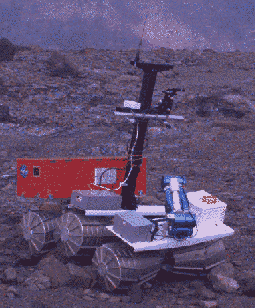

Should we go to Mars? Of course we should go to Mars, but we must do some
other things before we can go there. Let's see what might happen if we do
not do those things first.


SAGAN CITY, MARS, OCTOBER 14, 2055 Colonists on Mars watched helplessly today as a giant asteroid hit the Earth. It is believed that no one on the Earth survived the impact, but it is hoped that some people on board the space stations in orbit around the Earth may still be alive. A rescue ship was launched today from the Sagan City spaceport with the hope that it will arrive in time to rescue those who have survived the impact.So, before we go to Mars we had better make sure first that we have set up a system to defend the Earth from debris!
(The picture of the Mars colony on the right is by the famous artist Robert McCall , and it is used here with his permission. You may not use it in any way (like on your internet pages, for example) without first getting permission from him!)

MARS BASE, AUGUST 15, 2015 Astronauts on Mars today laid to rest Dr. Robert Zubrin, who died after being infected by the Martian organism which he had just recently discovered. While Dr. Zubrin had thought that he had safely stored his samples in a container, apparently when he returned from the site where he found the organism he tracked it into the Mars base on the soles of his boots.
So far the surviving astronauts have not shown any signs of being infected, and they appear to be in fine health. The astronauts have completely cleaned their return spacecraft, and it is hoped that there are no more Martian oragnisms on board it.
Health officials have ordered the surviving astronauts to cut short their mission and return to Space Station Freedom, where they will be placed in quarantine. "This should present no problem", said Dr. Daniel Usikov on board the space station. "We will have plenty of time to completely finish our experiments and leave before they get here."
Earlier today NASA spokeman David Steitz informed the press that both the President and the NASA Administrator would be making statements on the situation, but unfortunately our correspondent missed the briefing and the President's and Administrator's comments are still not available to us at this time.
So, before we go to Mars we need to make sure that there are no harmful life organisms living there. We can do this by using a long range rover on Mras to look for them, and NASA has been working on a rover like this with the Planetary Society. You can read about their work by clicking on the rover.
The Planetary Society is the world's largest group of people helping to promote the exploration and use of space. They are also worried about Earth getting hit by asteroids or comets, and they have given money to astronomers to help them find them. You can read about their effort to help astronomers find asteroids and comets by clicking here , or you can visit the Planetary Society by clicking here. 

WASHINGTON, D.C., FEBRUARY 25, 2009 By overwhelming votes in both houses, Congress today rejected the President's proposal for a manned mission to Mars. "As much as this mission would mean for our people, there is no way I can endanger their safety by using Kennedy (Spaceflight Center) to launch that much radioactive material.", said Sen. Richard "Dick" Scobee (R-FL.), "I have to agree with my colleague,", added Sen. Michael "Mike" Smith (R-TX.), "There is just no way that we can rely upon the current launch systems to provide that kind of safety."
The President's proposal was defeated by large margins in both Houses, despite intense lobbying efforts by NASA officials. "My people tell me that using the RLV to launch this paylaod is a safe thing to do, and I believe them.", said NASA Adminstrator William Graham after the defeat. "If its not safe to go now", said NASA Associate Administrator Larry Mulloy, "when will it be safe enough?" "We think that it is a safe thing to do.", added NASA's Associate Adminstrator for Spaceflight George Hardy.
"While I know NASA has made a great effort to make this design safe, I just don't think that it is safe enough.", Rep. Ellison "Harry" Onizuka (R-HI.) said shortly before casting his vote against the proposal. "My apologies to President Gingrich, but this one is just not going to fly.", commented Rep. Gregory "Greg" Jarvis (R-CA.) shortly after the vote was taken.
NASA's alternative plan to use liquid fueled engines for the Mars flight fared better, but was still defeated in both Houses by ample margins. "Sure, I wish we could go to Mars", said Rep. Christa McAuliffe (D-N.H.), "but if it takes that many launches to do it, there will be no money left in the budget for education." "I don't know how the President can ask for that much money for Mars when he well knows what kind of shape our cities are.", added Delegate Ronald "Ron" McNair (D-D.C.). "These guys need to seriously re-think their plan", added Rep. Judith "Judy" Resnick (D-OH.).
"I don't know what President Gingrich was thinking when he decided to send us this nonsense.", added Sen. Strom Thurmond (R-SC). "I guess he's just been in Washington too long."
So, before we go to Mars we need to have a better rocket engine. NASA's Lewis Research Center and the Air Force's Phillips Laboratory are working on just such a rocket engine right now, one that uses mirrors to focus sunlight on its fuel. This engine is as powerful and fuel efficient as a nuclear rocket engine, and is even cleaner than a a chemical rocket engine. You can learn more about it by clicking on the picture below .
